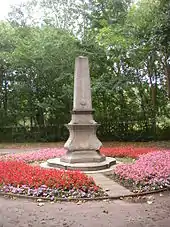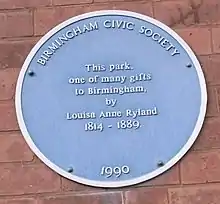Cannon Hill Park
Cannon Hill Park is a park located in south Birmingham, England. It is the most popular park in the city, covering 250 acres (101 ha) consisting of formal, conservation, woodland and sports areas. Recreational activities at the park include boating, fishing, bowls, tennis, putting and picnic areas.
| Cannon Hill Park | |
|---|---|
 Cannon Hill Park lake | |

| |
| Type | Public park |
| Location | Birmingham, England |
| Coordinates | 52°27′11″N 1°54′04″W |
| Operated by | Birmingham City Council |
| Status | Open year round |
| Website | birmingham |
It also contains Birmingham Wildlife Conservation Park, the mac theatre, and adjacent to the park is Edgbaston Cricket Ground.
History
On 18 April 1873,[1] a local benefactor, Miss Louisa Ann Ryland (1814–89) of Barford Hill House, Warwickshire, gave just over 57 acres (23 ha)[1] of meadow land, known as Cannon Hill Fields, to the Corporation and paid for the draining of the site to create a public park. J.T Gibson of Battersea was employed to transform the site. He constructed two large lakes, the smaller ornamental ponds and a bathing pool. 35 acres were devoted to ornamental gardens and shrub borders. Kew Gardens donated seeds and plants to establish the collection, this collection was used by students to enable them to study botany. It opened to the public in September 1873. A further 7 acres (2.8 ha) were given by the brewer John Holder in 1897, and in 1898 5 acres (2.0 ha) were acquired to straighten the River Rea, which is now culverted and runs along the western edge.
Features

A 1906 granite and bronze memorial to the dead of the Second Boer War by Albert Toft, stands on the western edge of the park. Grade II* listed, it was refurbished in 2012.[2][3]
In 1911 a 16th-century timbered house was moved from Deritend and re-erected in the park by the Birmingham Archaeological Society, to serve as a refreshment room and cricket pavilion. Named the Golden Lion Inn it is a Grade II listed building but is now in a very poor state of repair and fenced-off. The bandstand, the bridge over the lake ('Red Carriage Bridge'), and Cannon Hill House are also Grade II Listed.

Another memorial, unveiled on 27 July 1924, commemorates Scouts who fell in the first and (by later inscription) second world wars. It is in concrete, and was designed by the architect William Haywood.

A scale model of the Elan Valley Reservoirs, in the form of ornamental ponds, is located in a Japanese garden near the mac. It was built in the 1960s.
On 4 March 2019, a memorial to the British victim of the 2015 Bardo National Museum attack, and 30 British victims of the 2015 Sousse attacks, in Tunisia, was unveiled by Prince Harry, Duke of Sussex.[4][5] The memorial is called Infinite Wave.[4]
Events
A free 5 kilometre parkrun running event is held in the park every Saturday morning at 9am[6] and usually attracts over 750 runners each week. A free 2 kilometre junior parkrun event for children aged between 4 and 14 takes place at 9am on Sunday mornings.
The Great Birmingham 10k and Great Birmingham Run half-marathon events also pass through the park.
References
- Showell's Dictionary of Birmingham. Cornish Brothers. 1885. p. 30.
- "Birmingham war memorial to be restored". The Birmingham Press. 2012-01-04. Retrieved 4 January 2012.
- Historic England. "Boer War Memorial, Cannon Hill Park (1392586)". National Heritage List for England. Retrieved 29 July 2016.
- "Harry unveils Tunisia attacks memorial". BBC. 4 March 2019. Retrieved 4 March 2019.
- "Duke of Sussex unveils Sousse and Bardo Memorial". United Kingdom Government. Retrieved 4 March 2019.
- "Cannon Hill parkrun".
External links
| Wikimedia Commons has media related to Cannon Hill Park. |
- Birmingham City Council - Cannon Hill Park
- Historic England. "Bandstand (1343366)". National Heritage List for England.
- Historic England. "Bridge over lake (1220440)". National Heritage List for England.
- Historic England. "Golden Lion Inn (1075704)". National Heritage List for England.
- Historic England. "Cannon Hill House (1220702)". National Heritage List for England.
